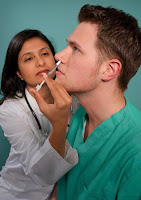
As mentioned in Part 1, the volume of online health-related information is astounding. Almost anyone can research a health condition, nutrition, medications, treatments, or alternative therapies with a few clicks of the mouse. However, can you separate good information from that which is worthless or even potentially dangerous, especially about diseases like interstitial cystitis/painful bladder syndrome?
- The first question to ask? Who owns the site and where do they get their funding? Financial resources can sometimes influence content. Is there a name, address, and phone number you can use to contact the website owners? Is the website information current?
- Second, does the site or company defines the disease properly? In the case of IC/PBS, does the disease description match what you know about the disease? Is the website promising a "cure" or "quick fix" when there is none? (At one point there was an e-book being sold for more than the cost of my books, that basically said a low-salt diet could cure IC. Someone made a lot of money from some very desperate people giving them bogus information!)
- Does the information on the website seem reasonable or does it "warn" against conventional treatments or products that you know to be helpful? In the case of IC, there isn't a one size fits all treatment plan. It is very important, in fact, to individualize treatment and it may take weeks or even months to put together a plan that works for you. Most quality health information sites are not afraid to link to other websites to provide the reader with as much information as possible to help themselves.
- Does the website misuse information from research studies to make a point, or do they make overly-dramatic statements that are not supported by research? Or, does the study walk you through research studies to help you understand the realistic implications of the information? Also important, are the studies reviewed on the site "peer-reviewed" or published in "peer-reviewed" journals? Are the studies reproducible?
- Does the website gear most of its information simply to sell a product or service, or does it seem to be well balanced with other information that can help a reader? Conversely, are the products or services recommended by other well respected sources such as the ICN and ICA?
- Ask what the credentials are of the website's authors. How involved are they in the IC community as a whole? Are they medical professionals or do they consult with medical professionals about the material they publish? Do they "listen" to the patient community to help push the boundaries of what we know about the disease and its treatments?
- Finally, remember, if it seems too good to be true, it probably is. Before making a health-related change based on Internet information, discuss it with your physician. Your doctor knows your condition the best and can help you evaluate your options.
Author, Speaker, Patient Advocate
 Be Confident in the Information You Read Here!
Be Confident in the Information You Read Here!
For step by step guidance for creating your own personal interstitial cystitis meal plan, see: Confident Choices®: Customizing the Interstitial Cystitis Diet.
For some basic, family-style, IC bladder-friendly recipes, see: Confident Choices®: A Cookbook for Interstitial Cystitis and Overactive Bladder
For health care workers: Interstitial Cystitis: A Guide for Nutrition Educators
**Please SHARE using the links below!**











